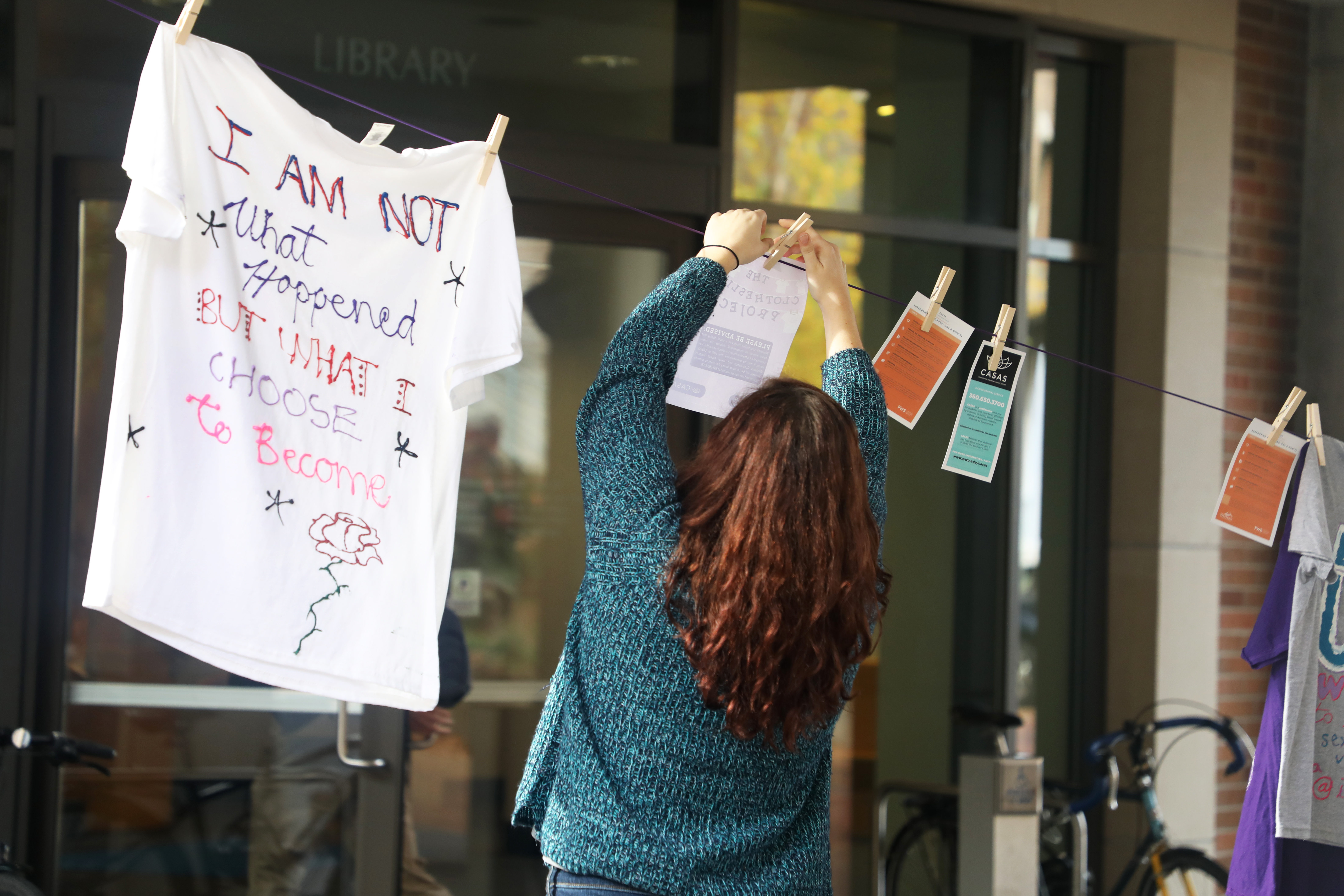Peer health educators for CASAS hung t-shirts on the lines after they were decorated. Ella Banken // AS Review
By MacKenzie Dexter
Consultation and Sexual Assault Services (CASAS) offered a series of resources and workshops in April for Sexual Assault Awareness Month. Events such as the Clothesline project, Hot and Ready Workshop, Supporting Survivors of Sexual Assault Workshop and a tabling in Red Square were held the week of April 15 to April 19.
“We are trying to broaden the activities and scope of outreach during this month in particular because we are not only looking to raise awareness of those issues,” Deidre Evans, CASAS coordinator and violence prevention specialist, said. “I feel like more people are aware of issues of dating violence and sexual assault on college campuses than they ever have been previously.”
Staff members of CASAS held these events to bring attention and start the discussion about sexual assault and how individuals of Western can support and help survivors.
“The goal of Sexual Assault Awareness Month is to create a space and a time where we can really talk about these issues and have it not be so taboo. The hope is that by doing that we can create a broader culture that accepts that this happens so that we are able to talk about it and work through it and hopefully make our community a little bit safer,” Jane Somerville, CASAS peer health educator, said.

This was the third Clothesline Project at Western. The project is a visual display of survivors’ stories of relationships and sexual assault. It also honors and supports survivors. People can decorate shirts with words of support and encouragement. The Clothesline Project started in 1990 to break silence and visually show how many women are survivors of assault.
“The idea is that we’re kind of airing our dirty laundry,” Somerville said. “It’s a good way for people to anonymously tell their story and also give survivors words of support. It creates a space where people are forced to look at this instead of sweeping it under the rug.”
According to Evans, the idea behind the Clothesline Project is that survivors can share their experience in a way that does not put them in the spotlight or force them to share their stories if they do not want to.
“This is a visual display of our community healing and knowing that they may be able to impact other survivors who see the message of their experience or have people start thinking about certain things that we normalize,” Evans said.

To broaden activities and resources during Sexual Assault Awareness month, the Hot and Ready Workshop, usually only conducted in residence halls, was open to all Western students for the first time.
“Consent is such an important part of sexual health, and Hot and Ready goes beyond explaining what consent is to help people have lots of clear and practical ideas for how to put consent into action,” Tracy Dahlstedt-Rienstra, health educator, peer sexual health education coordinator, said. “The activities are also intended to inspire discussion beyond the walls of the presentation room. We want to get more and more people talking about consent so that it becomes a more visible part of our campus culture.”
The week-long events are to start the conversation with a taste of the resources and events that CASAS offers throughout the year.
“I think there’s just always so many events that are going on on campus and so many resources that it’s hard for all of us to really be aware of what the options are and ways in which we can engage,” Evans said. “This is why we’re trying to have a larger presence, particularly during April, which is Sexual Assault Awareness month, so more people are seeing and hearing about CASAS.”

Evans discussed how people on and off Western’s campus can help and support survivors of sexual assault.
“This is not an issue that is unique to Western. This is not an issue that is unique to universities. This is a part of our broader society. We have to acknowledge that violence is something that happens and that we all know someone who has experienced violence,” Evans said. “The next thing that we can do is by believing people. So if we are believing people and supporting people in whatever healing process they choose to pursue, whether that is reporting or not reporting. Whether that is speaking to a professional help or confiding in a friend we have to support survivors and the decisions that they make.”
Somerville spoke about how students can engage with CASAS after the week of workshops and discussions. CASAS offers bystander prevention training, violence prevention and volunteer opportunities, which they are willing to do with any individual or group interested. CASAS has recently created a training that supports survivors of trauma and have educated faculty and students in learning how to help survivors. There are also volunteer programs for students through the Prevention and Wellness Services’ Peer Health Educator Program.
“CASAS works with any student who identifies as a survivor, so it is up to the survivors to share what they want about their experience or how they identify that experience and we will be a supportive process during that healing process,” Evans said. “It kind of looks different for everyone. People should know it’s a free and confidential resource.”
CASAS is located in Old Main 585B and is available by phone at 360-650-3770. More information is located on their website.

